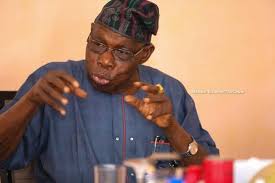![]()
THE battle between FG and Union has exchange baton, the struggle now is between States Governors and Union, over the new minimum wage. Following the NJF meeting on Monday, the governors said, they are not in any way bound or under the agreement of made by FEC and Union with the new consequential adjustment in wage. has shifted to the states following the decision of the governors to allow each state to negotiate percentage increase for their workers.
The negotiation with labour unions in the states will be based on the financial capability of each state.
But the governors agreed to the payment of N30, 000 to the least paid workers. The decisions were taken at Monday’s meeting of the Nigeria Governors’ Forum (NGF) in Abuja.
The governors declared that they were not bound by the agreement on “consequential increment” between the Federal Government and labour unions.
The Federal Government on October 17 sealed a pact to pay the new minimum wage of N30,000 with increase in salary across all grade levels in the civil service as follows: GL 07(23.2%); GL 08 (20%); GL09 (19%); GL 10-14 (16%); and 15-17 (14%).
The percentage increase is technically called “consequential adjustment.”
The governors rejected the “consequential increment” template of the Federal Government.
A governor at the meeting, who spoke in confidence, said: “What the Federal Government agreed with the labour does not apply to the states. The government at the centre only negotiated with its workers, it is now left to the states to do so.
“The truth is that, consequential increment is not part of the minimum wage policy, it is based on negotiation. The states are at liberty to engage their workers on percentage increase for all levels based on some indices.
“Each state will go and take its decision because fingers are not equal. States do not have equal resources. While some are buoyant, others are insolvent.
“The resources available to each state will determine its percentage increase.”
Another governor said: “Labour knows that the agreement at the federal level is not binding on the states but it can help to guide our decision. We operate a federation and by the spirit of the constitution, states are not expected to subscribe wholesale to the Federal Government’s decision. This is why we have Joint Negotiating Council (JNC) at the state level.
“The negotiating power of each labour group in the state might determine whether or not the workers in such state will get federal structure, a lesser increment or more increment than those at the centre.
“Some of us are hopeful that the Nigerian Governors Forum (NGF) will also come up with guidelines to assist the states on consequential increment.”
Briefing reporters after the sixth meeting of the NGF, its Chairman and Ekiti State Governor Kayode Fayemi, who read the communiqué, said: “”The forum sympathise with our colleague, Governor Obiano over the recent Onitsha fire incident, in which it lost some of its citizens.”
After reading the communique, Fayemi took questions from reporters on some issues contained in the group’s resolutions.
On whether the states were to jettison the framework developed and adopted at the last Federal Executive Council (FEC) meeting on the payment of the new minimum wage, he said states were going to determine their fate as far as the isse of minimum wage was concerned.
Fayemi said: “I am sure you know that the FEC does not determine what happen in the states. States have their own Executive Councils. and that is the highest decision-making body at the state level .




